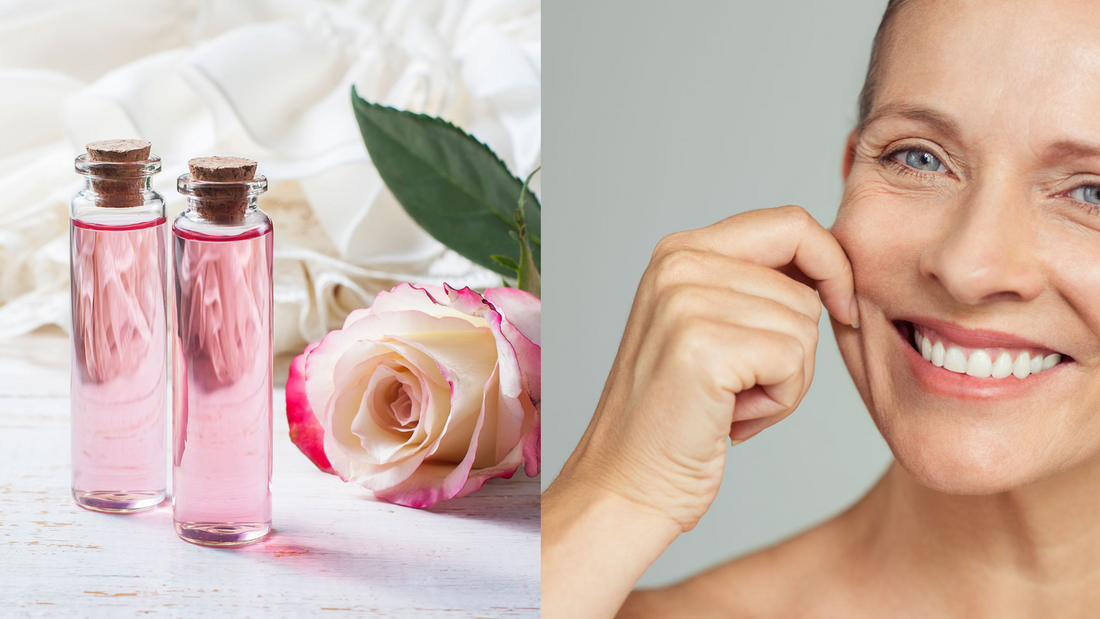
Rose Water: The Secret Weapon in Anti-Aging Skin Care
Share
The Basics
Would a rose by any other name still smell as sweet? We think yes. Because roses and rose water can do wonders for anti-aging skin care. Rose petals have a natural resistance to microbial attack and anti-bacterial properties to keep your skin fresh and clean.
Obviously, the fragrance is divine. It has the power to reduce inflammation and soothe redness. To top it all off, the anti-oxidant properties in rose water will help reduce signs of aging and prevent wrinkles.
B and E Positive
The cleansing properties of rose water make it a favorite in many natural face washes and toners. It is packed full of vitamin B which is great, because a vitamin B deficiency can lead to blemishes and rashes. Additionally, rose water contains Vitamin E which can reduce inflammation and slow the signs of aging. Vitamin is E is one of rose water’s many antioxidants.
For Wrinkles
The anti-aging properties of rose water are mainly attributed to its antioxidant content and toning capabilities. The antioxidants reduce free radicals which cause or increase signs of aging and affect the collagen process. The toning capabilities of rose water, and its natural ability to maintain your skin’s ph (oil) balance, make it a favorite in moisturizers and mists.
Zits Too
The anti-microbial and anti-bacterial properties of rose water reduce the causes of blemishes such as zits, pimples and red bumps. Microbes and bacteria can enter your pores and cause clogs. A clogged pore develops into a blemish as part of your skin’s removal process. The sebum which forms around the clog develops into a zit. Removing microbes and bad bacteria will help reduce the frequency of blemishes.
How to Use Rose Water for Skincare
Rose water is a versatile ingredient that can be used in various ways for skincare. Here are some ideas:
- As a toner: After cleansing your face, apply rose water to a cotton pad and gently swipe it over your face. This will help remove any remaining impurities and balance the pH of your skin.
- As a face mist: Transfer rose water to a spray bottle and mist your face throughout the day to keep it refreshed and hydrated.
- As a face mask: Mix rose water with other ingredients like honey or clay to create a face mask that can hydrate, brighten, and soothe the skin.
- As an ingredient in skincare products: Look for skincare products that contain rose water to enjoy its benefits without the hassle of making your own.
Benefits of Rose Water for Hair
In addition to its benefits for the skin, rose water can also be used to improve the health and appearance of hair. Here are some benefits:
- Hydrates and conditions: Rose water can help hydrate and condition the hair, leaving it soft, smooth, and shiny.
- Reduces dandruff: Rose water's anti-inflammatory and anti-bacterial properties can help reduce dandruff and soothe an itchy scalp.
- Stimulates hair growth: The vitamins and antioxidants in rose water can help nourish the hair follicles and stimulate hair growth.
Here's how to use rose water for hair:
- As a hair rinse: After shampooing and conditioning your hair, rinse it with rose water to help condition and hydrate it.
- As a scalp treatment: Mix rose water with other ingredients like aloe vera gel or coconut oil and massage it onto your scalp. Leave it on for 30 minutes before shampooing to help reduce dandruff and stimulate hair growth.
- As a hair mist: Transfer rose water to a spray bottle and mist it onto your hair throughout the day to keep it hydrated and refreshed.
More About DIY Rose Water Recipes
- If you want to make your own rose water at home, here are two recipes to try:
- Stovetop method: Place fresh rose petals in a pot and add enough distilled water to cover them. Bring the water to a simmer and let it cook for about 30 minutes. Strain the liquid and transfer it to a jar. Store in the refrigerator for up to one month.
- Steam distillation method: Fill a pot with distilled water and place a heatproof bowl in the center. Add fresh rose petals to the water and cover the pot with a lid upside down. Bring the water to a simmer and let it cook for about 45 minutes. As the water evaporates, the steam will collect on the lid and drip into the bowl. After the process is complete, transfer the liquid to a jar and store in the refrigerator for up to one month.
You can find rose water as an active ingredient in our Very Toney and Gemma Crema Anti-Aging Serums. They join other natural ingredients such as Aloe, Sunflower Oil and Radish Root to help lift and firm your skin. More than 20 active botanical ingredients improve the appearance and clarity of your skin while improving elasticity and firmness. If a whole serum is not your thing, we do hope you’ll pick up some rose water at your local natural food supplier.
If you'd like to try making some home made rose water check out our recipe:
For More on the Health Properties of Rose Water Try:
Good Housekeeping: https://www.goodhousekeeping.com/beauty/anti-aging/g28118423/best-rose-water-sprays/
Or
Healthline: https://www.healthline.com/health/rose-water-benefits



